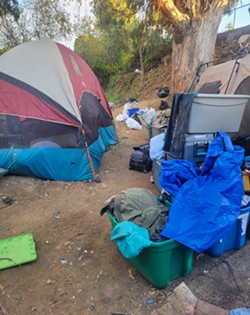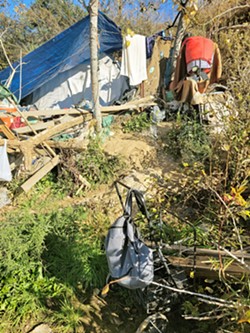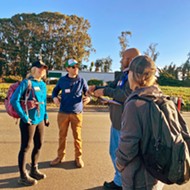You can't stay here: Homeless advocates criticize Morro Bay's new camping ordinances, ask for more homeless outreach
By Adrian Vincent Rosas[{
"name": "Newsletter Promo",
"id": "NewsletterPromo",
"class": "inlineCenter",
"insertPoint": "4",
"component": "15264767",
"requiredCountToDisplay": "0"
},{
"name": "Ad - Medium Rectangle CC01 - 300x250",
"id": "AdMediumRectangleCC01300x250",
"class": "inlineCenter",
"insertPoint": "8",
"component": "2963441",
"requiredCountToDisplay": "12"
},{
"name": "Ad - Medium Rectangle LC01 - 300x250",
"id": "AdMediumRectangleCC01300x250",
"class": "inlineCenter",
"insertPoint": "18",
"component": "2963441",
"requiredCountToDisplay": "22"
},{
"name": "Ad - Medium Rectangle LC09 - 300x250",
"id": "AdMediumRectangleLC09300x250",
"class": "inlineCenter",
"insertPoint": "28",
"component": "3252660",
"requiredCountToDisplay": "32"
}]
Wendy Blacker knows what living in a homeless encampment is like.
She understands what it means when your whole life—filled with struggles against addiction and a loss of faith in the system—gets uprooted because your living situation has become untenable.
"When it is all you have at that moment, it's not just an easy process of packing everything up and leaving it behind," Blacker said. "You are losing whatever concept of home you managed to build for yourself, so why would you want to leave?"
Now, as a homeless services provider, she's at a crossroads with the city of Morro Bay. She's worked with the city to provide services through her nonprofit 805 Street Outreach since the City Council passed a new set of ordinances targeting encampments.
Unanimously passing the two new ordinances on Jan. 9, the council voted to more strictly enforce against large homeless encampments and overnight car camping. The new rules follow those set by two emergency ordinances adopted by the city on Dec. 13, 2023.
"We wanted to pass those emergency ordinances through the City Council at the time to ensure the safety of those in the large public camps that were living in waterways and high-risk flood zones," Morro Bay Fire Chief Daniel McCrain said. "It was about getting those at risk out of risk as fast as we could within the realm of the law."
McCrain worked with Morro Bay Police Chief Amy Watkins and other city staff to formulate the ordinances over the last year in compliance with state law. The camping ordinance sets rules for where camps are and aren't allowed, how large they can be, what activities are illegal, and the types of materials people can keep in their camps.
"Our goal is to keep those camps small and allow them the safety of having a place to stay while keeping themselves and the city clean," McCrain said.
But the impact of the new ordinances leaves advocates like Blacker concerned that the city didn't cover its bases.
Both Blacker and residents who spoke during public comment at the Jan. 9 meeting said they saw people from encampments targeted by December's urgency ordinances move to other areas of the city, such as behind schools and random sidewalks in hope of complying with the new rules.
"If you really look at it, these people from these camps that had to move were shot-gunned throughout the city," Blacker said. "There is no place for them to go if they are not ready to get off the streets."
The ordinances did succeed in keeping those in encampments safe from potential flooding caused by rain, which Blacker agreed was a legitimate concern. However, she said those rules didn't really solve the issues that drove them to an encampment in the first place.
"I think the main issue myself and a lot of people with similar mindsets have with these ordinances is the fact that they don't address the problem at hand," Blacker said. "You are moving these people and spreading them out, and it's not doing much to restore their faith in a system they feel has left them behind."
Rather than moving homeless people from point A to point B, Blacker said, the city needs to conduct more outreach to encampments and have more options for temporary and permanent housing.
"What's affecting and—to be frank—what is killing the homeless population out here is the lack of affordable housing and transitional housing options," she said. "And that will take time to implement, so the best option outside of these ordinances, which again don't change anything, is to go out and talk with them."
Because that trust isn't there, she said, many in homeless encampments feel that even if they do accept the help of those promising a better place for them, they don't see anything good come out of it in the long run.
"Most homeless people have lost faith in service providers—whether that's social services, veterans services, or health providers—there's this persistent lack of trust that things will get better once you are out," Blacker said. "You need face-to-face interaction, you need city officials going out and talking to these people, that's the stuff that will get people to work with you on getting better."
However, Blacker does believe that Morro Bay has noble intentions with the ordinances it passed.
"I had a moment where Chief Watkins, when we first started working together, where she came up and apologized to me," Blacker said. "And I remember being confused as to why, but then she clarified and said, 'I am sorry if there was ever a moment where you felt like the police force antagonized you when you were homeless."
That humanizing moment was part of why Blacker wanted to work with the city to expand the work that 805 Street Outreach provides in the community by setting up shower stalls for people in encampments on Feb. 15.
She agreed to provide the showers as part of the city's initial efforts to reach out to these communities.
"Just showing that level of kindness to someone in that situation means so much [especially] when you are homeless like that and you have the opportunity to take a nice warm shower, it is almost ethereal," she said. "I've made things like these backpacks that are effectively a movable house in a bag, with a full blanket, tent, everything you would need to live in one spot, but compact enough to get it and go."
McCrain acknowledged that the city needs to address homelessness outside of the ordinances with ongoing outreach to encampments and by listening to homeless advocates like Blacker.
"We understand that this ordinance is not a one-size-fits-all solution; it was never meant to be that," he said. "We put a lot of work into these ordinances that was not just done in a vacuum. ... It's part of the solution."
The city developed the new ordinances, McCrain said, through outreach and on-the-ground interactions with those in the community and the encampments.
"That will continue going forward as we want to ensure everyone understands our goals," he said.
While he understands that some, like Blacker and her organization, wish that the city would engage with the community more about their efforts, the city needs to take action and not just talk to people about taking action.
"A lot of time people within the community and even the city staff itself offer suggestions and ideas, but they never really go anywhere," he said. "What is important about these ordinances and the things we are doing going forward is the fact that they are actions, they are tangible, and they are getting things done."
He's hopeful that by continuing to listen to the community and work alongside groups like 805 Street Outreach, Morro Bay can begin to regain that trust that both he and Blacker consider to be vital to addressing removing people from these large encampments as humanely as possible.
"There is public engagement from all parties: residents, homeless individuals, and city staff alike, that is work to make sure we are all taking meaningful action that helps everyone involved," McCrain said. "Most importantly our goal is to treat people in these encampments with the most compassion and care that we can."
Blacker acknowledged that homelessness is a long-term issue that isn't going away anytime soon.
"Homelessness cannot be eradicated, but it can be eased," Blacker said. "The people in these camps need to have that trust in you that things will get better—because once they take that step, they are going to get better." Δ
Reach Staff Writer Adrian Vincent Rosas at [email protected].
Latest in News
Comments (6)
Showing 1-6 of 6
Readers also liked…
-

Coast Unified teachers upset over new position's salary and qualifications
Oct 20, 2022 -

SLO police identify alleged driver who hit and killed couple
Dec 22, 2022 -

When the levee breaks: Oceano residents, county officials walk a tightrope of regulations to manage Arroyo Grande Creek, which some say led to the levee's failure in January
May 18, 2023











